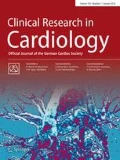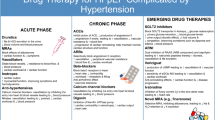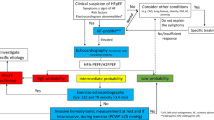Abstract
Background
Decline in renal and cognitive function may complicate early recovery after coronary-artery bypass grafting. AT1-receptor antagonists have been demonstrated to be neuro- and renoprotective. Aim of ARTA, a prospective, double-blind, randomised and placebo controlled study, was to detect whether preoperative treatment with candesartan influences postoperative cognitive and renal function.
Study protocol
One hundred and five patients eligible for coronary artery bypass graft surgery (65–85 years old, all suffering from hypertension and coronary artery disease, with stable kidney function) were randomized to candesartan (8 mg od) or placebo for between 8 and 11 days prior to surgery. Existing ACE-inhibitor/angiotensin receptor antagonist-therapy had to be stopped prior to the study. Validated cognitive function tests (trail making, Horn’s perfomance III und VI, divided attention and change of reaction, memory - immediate and delayed recall, digit span) were performed preoperatively, 1 week and 3 months after surgery. Renal function was assessed by creatinine clearance on the day before, 1 week and 3 months after surgery.
Results
Eighty-seven patients (n = 43 Candesartan, n = 44 placebo) were included in the ITT-population for analysis. Drug treatment had no adverse effect on perioperative blood pressure. Only five patients experienced a period of hypotension during introduction of anaesthesia (Candesartan 1/44, placebo 4/44). One week as well as three months after surgery, there were no differences in relevant cognitive function parameters compared to the status prior to surgery, independent from treatment. Creatinine clearance showed a clear decrease one week after surgery with a minor further reduction observed 3 months after surgery, but there was no difference between Candesartan and placebo treated patients. Between both groups, there were no significant differences in the number of adverse events and number of patients with adverse events nor in the incidence of renal failure with consecutive dialysis and cerebral strokes (candesartan 2, placebo 5) and possibly drug related severe adverse events.
Conclusion
This randomised placebo-controlled and prospective study in elderly patients does not support previous reports suggesting a substantial impairment of cognitive function after coronary artery bypass graft surgery. Preservation of cognitive and renal function was independent of pre-surgical administration of candesartan.


Similar content being viewed by others
References
Boodhwani M, Rubens FD, Wozny D, Rodriguez R, Alsefaou A, Hendry PJ, Nathan HJ (2006) Predictors of early neurocognitive deficits in low-risk patients undergoing on-pump coronary artery bypass surgery. Circulation 114:I461–I466
Brenner BM, Cooper ME, de Zeeuw D, Keane WF, Mitch WE, Parving HH, Remuzzi G, Snapinn SM, Zhang Z, Shahinfar S (2001) Effects of losartan on renal and cardiovascular outcomes in patients with type 2 diabetes and nephropathy. N Engl J Med 345:861–869
Coyle JD, Gardner SF, White CM (2004) The renal protective effects of angiotensin II receptor blockers in type 2 diabetes mellitus. Ann Pharmacother 38:1731–1738
Dahlof B, Devereux RB, Kjeldsen SE, Julius S, Beevers G, de Faire U, Fyhrquist F, Ibsen H, Kristiansson K, Lederballe-Pedersen O, Lindholm LH, Nieminen MS, Omvik P, Oparil S, Wedel H (2002) Cardiovascular morbidity and mortality in the losartan intervention for endpoint reduction in hypertension study (LIFE): a randomised trial against atenolol. Lancet 359:995–1003
Dupuis G, Kennedy E, Lindquist R, Barton FB, Terrin ML, Hoogwerf BJ, Czajkowski SM, Herd JA (2006) Coronary artery bypass graft surgery and cognitive performance. Am J Crit Care 15:471–478
Inada Y, Wada T, Ojima M, Sanada T, Shibouta Y, Kanagawa R, Ishimura Y, Fujisawa Y, Nishikawa K (1997) Protective effects of candesartan cilexetil (TCV-116) against stroke, kidney dysfunction and cardiac hypertrophy in stroke-prone spontaneously hypertensive rats. Clin Exp Hypertens 19:1079–1099
Ito T, Yamakawa H, Bregonzio C, Terron JA, Falcon-Neri A, Saavedra JM (2002) Protection against ischemia and improvement of cerebral blood flow in genetically hypertensive rats by chronic pretreatment with an angiotensin II AT1 antagonist. Stroke 33:2297–2303
Jensen BO, Hughes P, Rasmussen LS, Pedersen PU, Steinbruchel DA (2006) Cognitive outcomes in elderly high-risk patients after off-pump versus conventional coronary artery bypass grafting: a randomized trial. Circulation 113:2790–2795
Knipp SC, Matatko N, Wilhelm H, Schlamann M, Massoudy P, Forsting M, Diener HC, Jakob H (2004) Evaluation of brain injury after coronary artery bypass grafting. A prospective study using neuropsychological assessment and diffusion-weighted magnetic resonance imaging. Eur J Cardiothorac Surg 25:791–800
Leurs PB, Mulder AW, Fiers HA, Hoorntje SJ (1989) Acute renal failure after cardiovascular surgery. Current concepts in pathophysiology, prevention and treatment. Eur Heart J 10(Suppl H):38–42
Lewis EJ, Hunsicker LG, Clarke WR, Berl T, Pohl MA, Lewis JB, Ritz E, Atkins RC, Rohde R, Raz I (2001) Renoprotective effect of the angiotensin-receptor antagonist irbesartan in patients with nephropathy due to type 2 diabetes. N Engl J Med 345:851–860
Lithell H, Hansson L, Skoog I, Elmfeldt D, Hofman A, Olofsson B, Trenkwalder P, Zanchetti A (2003) The study on cognition and prognosis in the elderly (SCOPE): principal results of a randomized double-blind intervention trial. J Hypertens 21:875–886
Mogensen CE, Neldam S, Tikkanen I, Oren S, Viskoper R, Watts RW, Cooper ME (2000) Randomised controlled trial of dual blockade of renin-angiotensin system in patients with hypertension, microalbuminuria, and non-insulin dependent diabetes: the candesartan and lisinopril microalbuminuria (CALM) study. BMJ 321:1440–1444
Myers BD, Hilberman M, Carrie BJ, Spencer RJ, Stinson EB, Robertson CR (1981) Dynamics of glomerular ultrafiltration following open-heart surgery. Kidney Int 20:366–374
Newman M, Croughwell ND, Blumenthal JA, White WD, Lewis JB, Smith LR, Frasco P, Towner EA, Schell RM, Hurwitz BJ (1994) Effect of aging on cerebral autoregulation during cardiopulmonary bapass: association with postoperative cognitive dysfunction. Circulation 90(Suppl II):II243–II249
Newman MF, Croughwell ND, Blumenthal JA, Lowry E, White WD, Spillane W, Davis RD, Jr., Glower DD, Smith LR, Mahanna EP, et al (1995) Predictors of cognitive decline after cardiac operation. Ann Thorac Surg 59:1326–1330
Newman MF, Kirchner JL, Phillips-Bute B, Gaver V, Grocott H, Jones RH, Mark DB, Reves JG, Blumenthal JA (2001) Longitudinal assessment of neurocognitive function after coronary-artery bypass surgery. N Engl J Med 344:395–402
Nishimura Y, Ito T, Saavedra JM (2000) Angiotensin II AT(1) blockade normalizes cerebrovascular autoregulation and reduces cerebral ischemia in spontaneously hypertensive rats. Stroke 31:2478–2486
Panesar SS, Athanasiou T, Nair S, Rao C, Jones C, Nicolaou M, Darzi A (2006) Early outcomes in the elderly: a meta-analysis of 4,921 patients undergoing coronary artery bypass grafting–comparison between off-pump and on-pump techniques. Heart 92:1808–1816
Parving HH, Lehnert H, Brochner-Mortensen J, Gomis R, Andersen S, Arner P (2001) The effect of irbesartan on the development of diabetic nephropathy in patients with type 2 diabetes. N Engl J Med 345:870–878
Roach GW, Kanchuger M, Mangano CM, Newman M, Nussmeier N, Wolman R, Aggarwal A, Marschall K, Graham SH, Ley C (1996) Adverse cerebral outcomes after coronary bypass surgery. Multicenter study of perioperative ischemia research group and the ischemia research and education foundation investigators. N Engl J Med 335:1857–1863
Shaw PJ, Bates D, Cartlidge NE, French JM, Heaviside D, Julian DG, Shaw DA (1987) Neurologic and neuropsychological morbidity following major surgery: comparison of coronary artery bypass and peripheral vascular surgery. Stroke 18:700–707
Sotaniemi KA (1995) Long-term neurologic outcome after cardiac operation. Ann Thorac Surg 59:1336–1339
Vraamark T, Waldemar G, Strandgaard S, Paulson OB (1995) Angiotensin II receptor antagonist CV-11974 and cerebral blood flow autoregulation. J Hypertens 13:755–761.
Werner C, Baumhakel M, Teo KK, Schmieder R, Mann J, Unger T, Yusuf S, Bohm M (2008) RAS blockade with ARB and ACE inhibitors: current perspective on rationale and patient selection. Clin Res Cardiol 97:418–431
Author information
Authors and Affiliations
Corresponding author
Additional information
Both centres contributed equally to the study.
Rights and permissions
About this article
Cite this article
Flesch, M., Knipp, S., Kessler, G. et al. ARTA: AT1-receptor blocker therapy in patients undergoing coronary artery bypass grafting. Clin Res Cardiol 98, 33–43 (2009). https://doi.org/10.1007/s00392-008-0719-9
Received:
Accepted:
Published:
Issue Date:
DOI: https://doi.org/10.1007/s00392-008-0719-9




